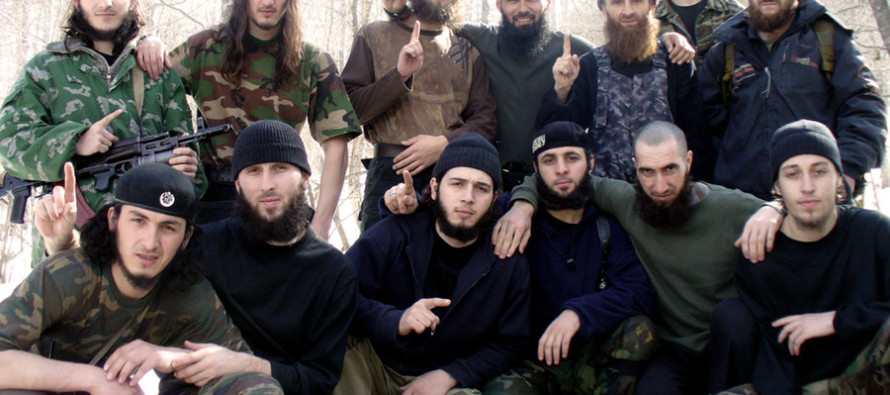
Chechen Involvement in Middle East Fighting a Growing Concern for Russian and European Governments
Publication: Eurasia Daily Monitor Volume: 12 Issue: 87
By:

After each death of a Chechen in Syria or Iraq, the involvement of Chechens in Middle Eastern conflicts becomes a hot topic of discussion in the Russian media. The recent death of a high-profile Chechens from the Northern Front of the Islamic State (IS) organization, Ibrahim Shishani, also prompted a spike in news reports (TASS, May 2). Quoting the Iranian TV channel Press-TV, Russia’s TASS state news agency said the slain militant was responsible for organizing the April attack on one of the largest oil refineries in Iraq, located in the city of Baiji, some 180 kilometers away from Baghdad. Even though war in Syria has demonstrated that Iranian and Kurdish news sources are unreliable, Russian news agencies still made extensive use of the Iranian coverage. Nearly all of Russia’s news agencies republished the story about the death of the high-profile Chechen IS commander (Google.fr, accessed May 8).
The Russian media, however, did not supply any details of the killing apart from what Iranian TV reported. Even worse, some media outlets rushed to announce the death of another Chechen commander, Umar Shishani (Tarkhan Batirashvili), confusing him with Ibrahim Shishani. Russian media apparently have no concrete knowledge of the true situation on the ground in the Middle East (Kavkazsky Uzel, Lenta.ru, others, May 2).
The two Chechens have nothing in common apart from the same nickname “Shishani,” which means “Chechen” in Arabic. This was the ninth announcement of the death of Umar Shishani in recent months. Ibrahim Shishani was only one of many middle-level militant commanders, and endowing him with a high status was an attempt to increase the significance of the operation by the Shiites, which was essentially a propaganda move. Ibrahim Shishani himself appeared in the news only once, when rebels under the command of Umar Shishani took over Mining Military Airport, in Syria, in August 2013, and he commented on the battle.
This latest episode illustrates how poorly Russia is informed about the involvement of Russian citizens in the Middle Eastern conflicts. For example, at the end of April 2015, Russian media announced that law enforcement agencies had identified seven residents of Chechnya who went to Syria during the period of 2014–2015. Among the seven suspects were 22-year-old Khasan Sangariev and 26-year-old Said-Khamzat Magomadov, both residents of the Chechen town of Urus-Martan. The others were 25-year-old Khadi Aslakhanov and 35-year-old Akhmed Chataev, both residents of Vedeno district; 21-year-old Askhab Alkhazov and 25-year-old Khusein Abubakarov, both residents of Kurchaloi, and Khasan Aidamirov, a 23-year-old resident of Naur district (Ekhokavkaza.com, April 26).
Overall, according to the Kavkazsky Uzel website, in the period from January 1, 2014, to April 25, 2015, the authorities launched at least 62 criminal investigations against residents of the North Caucasus Federal District on charges of participation in the Middle Eastern war. The government attempted to prosecute people who went to fight in Syria and Iraq as well as those who returned from the Middle East to the North Caucasus (Kavkazsky Uzel, April 26). Residents of Chechnya, Kabardino-Balkaria, Ingushetia, Dagestan and Stavropol region were among the prosecuted individuals, meaning that the Russian authorities need to identify the other 3,000–4,000 North Caucasians who are reportedly fighting in the Middle East. Since the government was able to determine only 62 names of suspects over the past year and a half, it is hard to imagine how long it will take the security services to reveal all names of the Russian citizens who are fighting in the ranks of Islamic State.
The only way the Russian authorities can discover the real names of other fighters is through the confessions of those who have returned from Syria. Militants return from Syria via several ways. One is when parents manage to entice their son or daughter back to Russia, using force, deceit or persuasion. The returnees immediately end up in the hands of the Russian Federal Security Service (FSB) and face trial under any circumstances (Rus.azattyq.org, May 6). The second way is when a militant who is fighting in Syria convinces his commander that he needs hospitalization in Turkey or deceives his commander by pretending he has to pick up his fiancé in Turkey but actually returns to Russia. Such people are not necessarily seeking to return home immediately, but rather are trying to wait it out abroad to make sure the Russian authorities forget about them. A third category is made up of those who decide to fight in the North Caucasus rather than in the Middle East, but there are only a handful of these.
The authorities in nearly all large European countries literally hunt for any Chechen who went to Turkey, even those who went there on holiday. Since the second half of 2014, all European countries have been tracking every Chechen who visits either Russia or Turkey and alert the country where the Chechen is registered as a refugee (Currenttime.mobi, January 21). Dozens of Chechens have returned to Europe from the Middle East in hopes that the authorities had not noticed their absence.
Thus, the involvement of Chechens in the Middle East remains a problem for all security services. However, the Russian special services are in an especially dire situation. The return of IS’s North Caucasian militants from the Middle East to Russia may transform the Caucasus Emirate (indigenous to the North Caucasus) into the Islamic State. In any case, those who fought in the Middle East under the flags of al-Qaeda and the Islamic State may continue to fight in the North Caucasus, thereby further increasing the tensions in the region.




